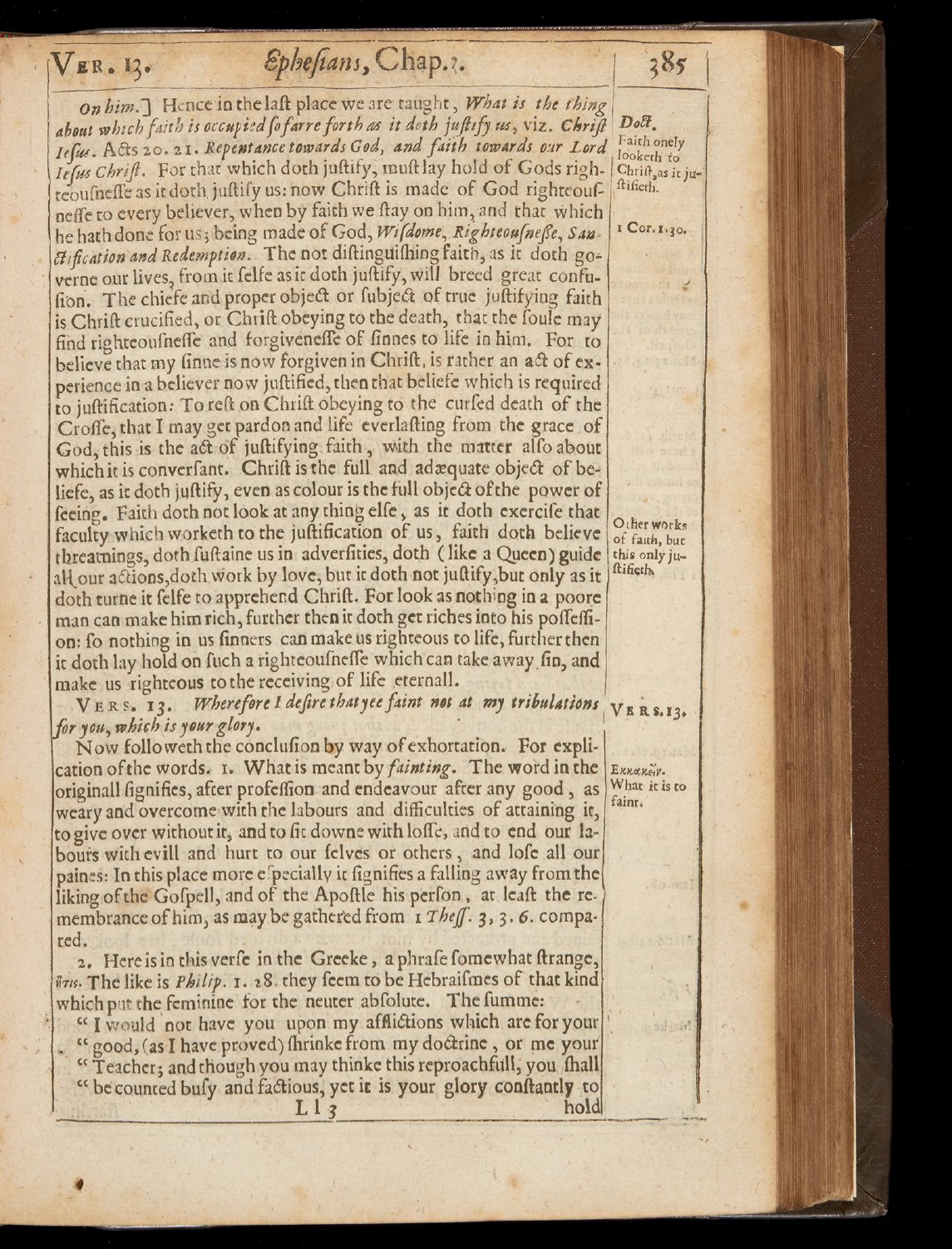

V5ß
.13.
6pI efram,
Chap.
%.
385
On
him.]
Hrnce
in
the
laft place we are
taught
What
is the
thing
about
which
faith
is
occup
id
fofarre
forth
a
it
dccth
juftify
as,
viz. Chrift
Dolf.
lefiu.
As
zo.
zr.
Repentance towards
God,
and
faith
towards
our
lord
¡ootedtne!y
tefu
Chriff.
For
that
which
doth
juftify,
muff lay
hold
of
Gods
righ-
chriR,asitju-
teoufneflè
as
it
dorh juftify
us:
now Chrift
is
made
of
God
righreout
4ified,.
neffe
to every believer, when by faith
we flay on
him,
and
that which
he
hath done for us; being made
of
God,
Wifdorne, Righteoufnefse,
San.
`
eor
'
a°
fification
and
Redemption.
The not
diftinguifhing
faith,
as
it
doth
go-
verne our lives,
from
it felfe
as
it
doth
jultify,
will
breed great confu-
fron.
The
chicfe and proper
objed
or
fubjec
of
true juftifying faith
is
Chrift
crucified, or
Chrift
obeying to the death,
that the
foule may
find
righteoufneffè and forgiveneffe
of
finnes
to
life
in
him.
For to
believe that
my finne
is
now forgiven
in
Chrift,
is
rather
an
apt
of
ex-
perience
in
a
believer now juftified, then
that
beliefe which
is
required
to juflification:
To
reft on
Chrift
obeying to the curled death
of
the
Croffe, that
I may get pardon
and life everlafting
from the grace
of
God,
this
is
the
ad
of
juftifying
faith,
with the matter
alfo
about
which
it
is
converfant. Chrift
is
the
full and adrequate
objeét
of
be-
liefe,
as
it
doch
juftify,
even
as
colour
is
the
full
objet
of
the
power
of
feeing. Faith dorh not look at any thing
elfe,
as
is
doth exercife
that
faculty
which worketh to the
juftification
of
us,
faith doch believe
Vhfa
ñ
ek,s
threamings, doth
fuftaine
us in
adverfities,
doth
(
like
a
Queen)
guide
this only ju_
altour
aelions,doth work by love, but
it
doth not juttify,but
only
as
it
a'h
"ah
doth
turne it
felfe ro
apprehend
Chrift. For
look
as
nosh ng
in a
poore
man can make
him
rich,
further then
it
doth get
riches
into
his poffefli-
on: fo
nothing
in
us
finners can make
us
righteous
ro life,
further then
it
doth
lay
hold
on fuch
a
righteoufneffe which can
take
away, fin, and
make
us
righteous to the
receiving
of
life eternal!.
V
E
R S.
I
3.
Wherefore
1
deftre
that
yee
faint
not
at
my
tribulations
vs,,
3.
or you, which
isyour glory.
Now
followeth the conclufion by
way
of
exhortation. For
expli-
cation ofche
words.
r.
What
is
meant by
fainting.
The
word
in
the
Ekxa
,r.
originall
fgnifies,
after profelïion
and
endeavour after
any
good
,
as
what
t°
weary and
overcome with the labours
and difficulties
of
attaining it,
faint.
to
give
over
without
it, and
to
fit
downe with
loffe, and
to
end
our
la-
bours with evill and hurt to our
felves
or others
,
and lofe all our
paints: In this place more e:pecialiv
is
fignifies
a
falling away
from
the
liking
of
the Gofpell,
and
of
the
Apoftle
his
perfon
,
at leaft
the
re-
membrance
of
him,
as
may be gathered from
r
Thef.
3,
3.6.
compa-
red.
z. Here
is
in
this
verne in
the
Greeke
,
a phrafe
fomewhat ftrange,
TM.
The
like
is
Philip.
r.
a
8.
they
feem
to
be Hebraifines
of
that
kind
which
pit
the
feminine
for the
neuter
abfolute.
The
fumme:
"
I
would not
have
you
upon my
affli &ions
which
are
for your
"
good,
(as
I
have
proved)
fhrinke
from my doctrine
, or me
your
"
Teacher;
and
though you
may thinke this reproachful!, you (hall
t
be counted bufy and
faEtious,
yet
it
is
your glory
conftantly
to
L
13
hol

















